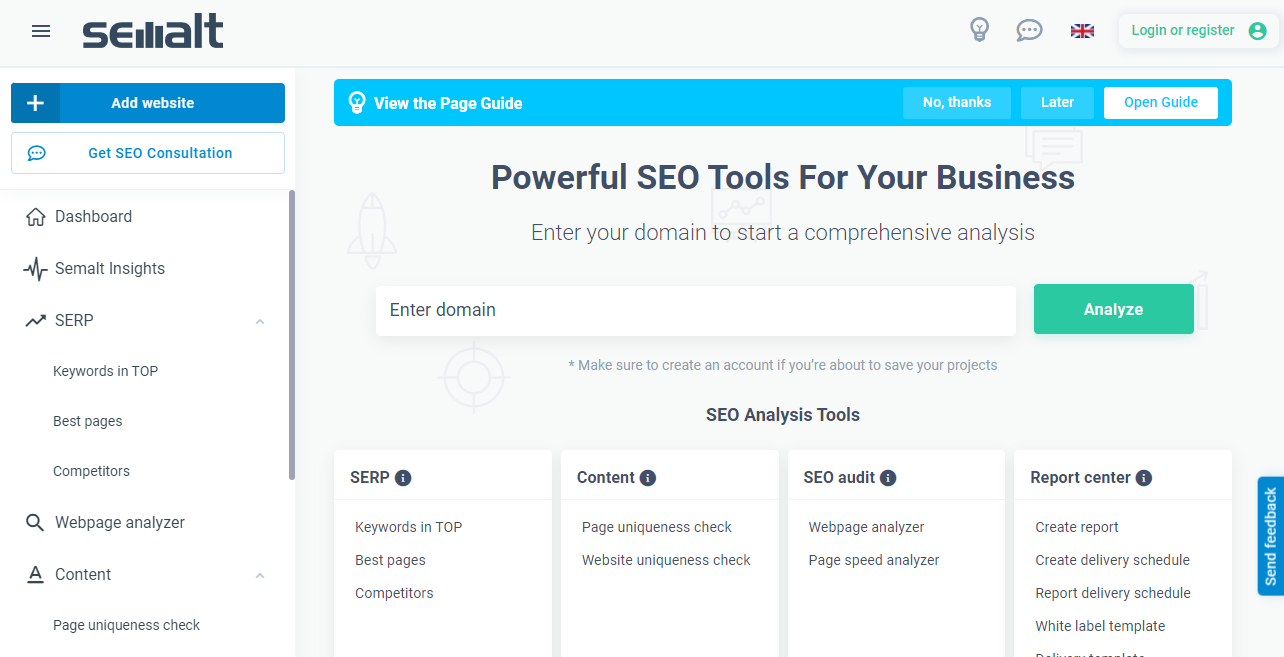What Is Semantic Search And Why Is It Important For SEO? The Answer Gives Semalt SEO Agency

Several algorithm updates over the years have transformed Google into a semantic search engine that strives to understand search intent to provide more relevant results.
This means that the days of keyword stuffing are over, and focusing on high-ranking keywords is not the alpha and omega of search engine optimization (SEO). If you want to rank high in search engine results pages (SERPs), you need to learn how to use search terms in the right semantic context. This brings us to semantic search, latent semantic indexing keywords (LSI keywords) and their importance in your SEO strategy.
Another very important thing to consider is to have a better SEO tool like the Dedicated SEO Dashboard to find all the most useful keywords for your SEO strategy. Let's start by understanding what semantic search is.
What is semantic search?

Semantic search is a process by which search engines like Google do more than just retrieve pages that contain exact matches to the search terms used. Google's semantic search takes into account the search intent and contextual meaning of search queries to provide relevant high-quality answers.
But what does semantic search mean for your SEO strategy?
To answer this question, it's important to know that semantic search is completely different from lexical search. The lexical search was a technique used by search engines that required users to enter exact, correctly spelt words to find what they were looking for. And even with this effort, searchers were often faced with SERPs filled with literal matches but irrelevant results. Google's semantic search fills this gap by understanding the intent and meaning of a search query to provide meaningful and contextual results instead of literal ones.
From an SEO and content strategy perspective, this means that the key to improving SERP visibility today is creating content targeted to search intent. If you're aiming for relevance rather than keywords, you're well on your way to sustainable SEO success.
How does semantic search work?

A question can be phrased in many different ways. People don't always use the same words, languages and sounds when they search for something online. Sometimes they don't even know how to phrase their question correctly. For this reason, search engines today focus on the meaning of search queries and not just on the right keywords.
But how exactly does semantic search work? How does Google understand a search query?
Search engines like Google take a semantic approach and interpret search intent based on various factors such as:
- User's search history
- User location
- Real-time context or current events
- Variations in spelling or substitution of search queries
- Meaning and intent of the search query (natural language understanding)
- Relevance of the website content (matching of main and latent semantic keywords)
- Content quality (competence, authority and reliability of the site)
- Website usability (mobile friendliness, page load speed and other usability factors)
- Context and metrics (location, search history and search parameters)
From these brief descriptions of how semantic search works, it's clear that Google is getting better and better at determining the meaning and semantic association of search terms used by Internet users. Unfortunately, this also means that optimizing your website for search has become more complex than ever.
But hope is not lost - understanding semantic keyword SEO, learning how to use semantic keywords, and creating a semantic context in your content will help you advance your SEO strategy.
An overview of semantic keyword search
It's difficult to open discussions about semantic search because the topic is vast and Google's semantic search engine is constantly evolving. Nevertheless, here are some key points about semantic search terms that will help you solidify your online strategy.
1. Topics become more important than keywords
High-volume keywords are not as important as they used to be. That's why SEO specialists and content professionals must learn to strategically use long-tail keywords in their content.
But more importantly, they need to spend time and effort looking at search intent and adding relevant topics that fulfill it to create quality content.
2. Keywords are still important
While Google is undoubtedly getting better at understanding the semantic association and motivation behind search queries, it is still learning to understand search intent.
Thus, using your trusted primary and semantic keyword tool to find the best search terms will continue to impact your SERP performance. Similarly, including keywords in your title tags, URLs, header and body tags, and metadata will always help improve your rankings.
3. Technical SEO is just as important as the content
Since Google is still not smart enough to really understand the meaning of words, you need to help the search engine understand what your content is about.
Using the right keywords and investing in top-notch content writing services are essential to semantic search engine optimization, but your technical SEO efforts are also important. Be sure to improve your metadata, optimize your site for mobile devices, and create crawl error reports for the best results.
How do you optimize your content for semantic search?

Now that you know how semantic search works, you might think that optimizing your content is too complex for a semantic search engine like Google. While it is indeed a huge undertaking, taking a semantic approach to your SEO and content marketing strategy will produce the effective and impactful results you expect from your campaigns.
With the right strategy and the right SEO partner, you can improve your website's organic visibility and even have a chance to earn a featured snippet position.
Are you ready to get started? Here are some semantic SEO tips to keep in mind:
1. Optimize your content for topics
As mentioned in the previous section, semantic keyword SEO places more emphasis on topics than keywords. Sticking to the old method of high-volume keyword targeting may be of limited use to your content strategy today.
Take the time to understand how keywords fit together to form a semantic context on a given topic, and then cover that topic comprehensively. Their goal is to create deep, original, quality content.
2. Always pay attention to search intent
Search queries are not just random strings of words. In fact, they indicate whether the user is looking for general information about a topic or if they are ready to buy something.
Search intent falls into four main categories:
- Informative
- Navigational
- Transactional
- Commercial
Pay attention to the searches that bring people to your site and the intent behind them. Creating content that directly addresses the intent of your target audience will help you improve your SERP performance and move up in the rankings.
3. Learn to use latent semantic indexing keywords
In the context of SEO, semantic keywords are words or phrases conceptually related to your main (subject) keyword. These semantically related words are not necessarily synonyms, but they help establish the context and meaning of another keyword.
Learning to use semantic keywords strategically will help you keep up with Google's algorithm updates. Using the right semantically related words shows search engines that your content covers important topics related to your target keyword and is, therefore, a useful resource.
Additionally, Google uses these semantic terms to better understand your content so that its search algorithms can display your content on more relevant SERPs.
4. Use a better semantic keyword tool
Learning how to use semantic keywords can be difficult if you don't know how to identify the right latent semantic keywords to include in the first place. Fortunately, you can accomplish this task with a better semantic keyword generation tool: the Dedicated SEO Dashboard.

It's the ideal SEO tool you need to gather the right information related to your industry and target audience and to succeed in any SEO strategy, no matter how complex it is.
Build a solid semantic search strategy with SEO experts
Search engines are getting better at understanding user intent. Therefore, you should open the discussion on semantic search strategies in your team as soon as possible. Understanding how to optimize your content for semantic search and which keywords are suitable for latent semantic indexing will lay the foundation for your SEO success.
Finally, always remember: what is a semantic search guide if you don't use it? Now that you've reached the end of this blog post, it's time to apply what you've learned. Focus on topics rather than keywords, pay attention to search intent, and learn to use semantic terms strategically. And if you're overwhelmed by the task, you can always enlist the help of skilled and experienced SEO experts.
At Semalt, we love helping businesses keep up with Google's ever-changing algorithms and achieve better online visibility. Our team of SEO experts is highly effective in keyword research, technical SEO, local SEO, and works in collaboration with our content experts to create original, quality and SEO-friendly content.
Would you like to benefit from our know-how and experience in the field of SEO for more success in your industry? Contact us today.